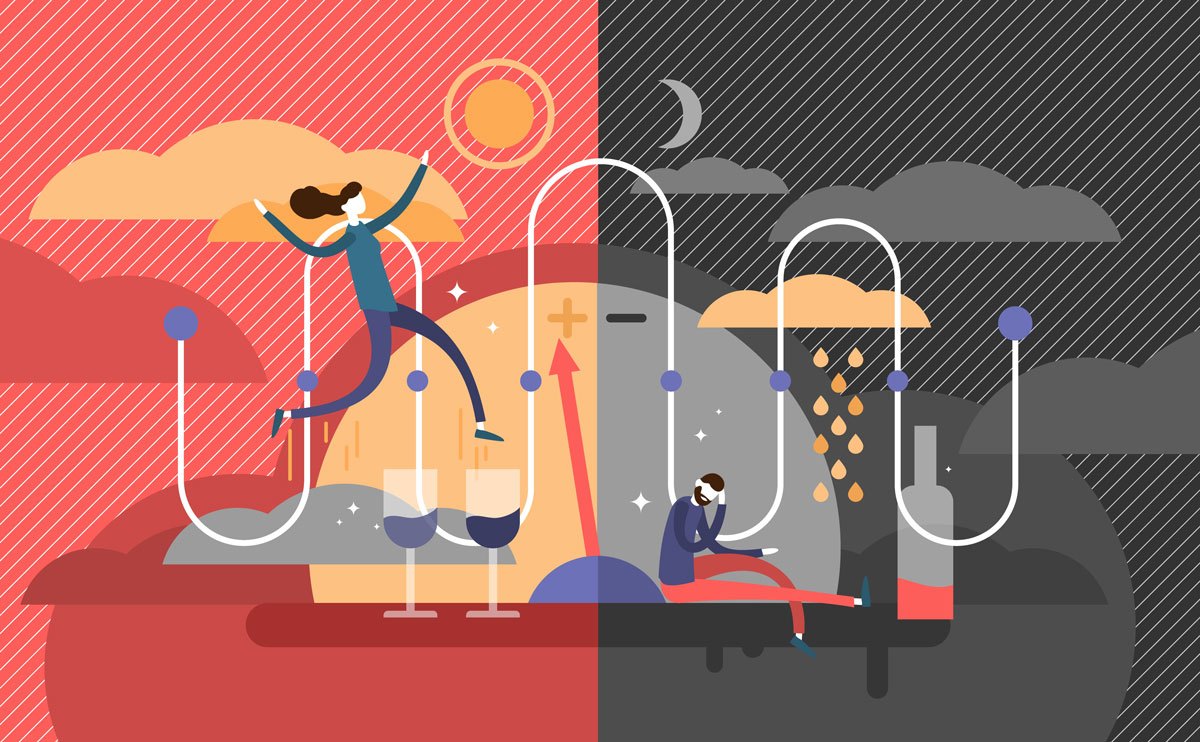Addiction and mental health issues often overlap. Most people who seek treatment for addiction will also have a mental health issue that needs to be addressed, whether they’re aware of it or not. A dual diagnosis is not to be taken lightly. For many people, it is the driving force behind their addiction. To focus on the addictive behavior while neglecting the mental health issue is to leave the greater part of the problem unsolved.
Many Mental Health Issues Lead to Substance Use.
There are many paths to addiction. You are probably aware that genetics play a large role in addiction, but there’s no single way people are genetically predisposed to addiction. Some people respond more positively to certain drugs, while others are protected by responding more adversely. However, conditions such as depression, anxiety, bipolar disorder, OCD, and schizophrenia all have strong genetic components too, and they all increase your risk of developing a substance use issue.
Exactly how substance use is connected to a mental health issue depends on the issue. Typically people try to self-medicate their mental health symptoms. For example, opioids significantly reduce the symptoms of depression and alcohol is a common crutch for people with social anxiety disorder. Alcohol also helps people with ADHD or bipolar disorder turn down the volume on their racing thoughts and staves off flashbacks or intrusive thoughts of people with PTSD. Anyone who can’t sleep because of PTSD might also be tempted to take benzodiazepines, which are highly addictive. Students who are extremely anxious about getting top marks may develop a dependence on amphetamines, such as Adderall.
You can’t Solve Addiction and Mental Health Issues Separately.
Treating an addiction without also treating the mental health issue is like bailing out the boat without plugging the hole. It can lead to temporary success at best. Treating the addiction without treating the cause leaves you vulnerable to relapse. Someone who enters treatment for addiction and doesn’t also get treatment for the co-occurring mental health issue is essentially left to deal with that issue without her primary coping mechanism.
You can’t expect to beat addiction without addressing the primary cause. Many mental health issues impair your ability to function. Depression, anxiety disorders, PTSD, OCD, personality disorders, and ADHD are all severely disruptive. Many people who develop substance use issues make a rational calculation that the the problems caused by substance use can’t be as bad as the problems caused by the mental health issue. In the end, they are often mistaken about this, but it’s important to remember that people don’t just develop substance use issues for no reason.
If you want to make it worth your while to stay sober, you have to address the underlying problem at the same time you address the addiction. There are a number of reasons for this. One is that these problems are often interconnected in complex ways. What’s more, new issues may arise during treatment. Detoxing can have unpredictable effects on your brain chemistry, and it can take a lot of trial and error to figure out how to get the medication right for certain conditions. It might even be a challenge to keep some people in treatment. For example, people with bipolar disorder will often have a manic episode and feel like they no longer need treatment. On the other hand, waiting to treat the mental health issue until later means an uphill battle in treating the addiction.
Addressing a Dual Diagnosis Requires Special Expertise.
It’s easy to oversimplify the relationship between addiction and mental illness. For example, if someone is depressed, it’s easy to think you can treat the depression and treat the addiction and they will be fine. In reality, a client may present a basket of ambiguous symptoms and it’s hard to know which are the most relevant. Depression often leads to addiction, but on the other hand, addiction often leads to depression. Complicating things further, the protracted withdrawal symptoms of many drugs look a lot like symptoms of depression. People say they feel emotionally numb, unmotivated, sluggish, achy, sometimes for months after detoxing. Does that mean they were depressed or are they just experiencing post-acute-withdrawal syndrome?
You might think that if someone had a mental health issue, she would know it, but that’s not always the case. You only know what happens inside your own head. It’s hard to know whether your normal experience is not normal at all. And people often have distorted memories of their past feelings and behaviours. Knowing what to look for, spotting the symptoms of a co-occurring disorder, and treating it effectively take training and experience.
What’s more, getting a co-occurring condition under control often requires medication. For example, one of the quickest ways to significantly reduce the risk of relapse for someone with ADHD is to get her on the correct medication. After that, treatment becomes much easier. The same is true of bipolar disorder and schizophrenia. However, you have to have a doctor to prescribe the medication and adjust it as needed. In some cases, especially for issues like depression and anxiety, medication may be helpful early on, but therapy and lifestyle changes may be more beneficial in the long run. Having medical staff trained in addiction can help make better decisions about long-term treatment.
In short, treating a dual diagnosis correctly is both crucial and complex. It’s not enough to rely on regular therapy sessions for addiction, with perhaps some SSRIs thrown in for good measure. A quality addiction treatment program must also be a quality mental health program.
If you or someone you love is struggling with a dual diagnosis, The Dawn Medical Rehab and Wellness center can help. We are one of Thailand’s most respected addiction treatment and wellness centers. We use cutting-edge treatment modalities, including TMS and CBT to provide personalized care to treat addiction, depression, anxiety, bipolar disorder, personality disorders, PTSD, and executive burnout. See our contact page to reach us by phone or email.
Related Posts
 Are You Thriving or Just Surviving? Living with High-Functioning Bipolar Disorder
Living with high-functioning bipolar disorder can mean that most of your energy is spent on handling intense internal emotions and feelings. However, trying to manage these symptoms on your own...
Are You Thriving or Just Surviving? Living with High-Functioning Bipolar Disorder
Living with high-functioning bipolar disorder can mean that most of your energy is spent on handling intense internal emotions and feelings. However, trying to manage these symptoms on your own...
 Trying New Treatments: Should Adderall Be Used to Treat Bipolar Disorder?
Figuring out how to best manage bipolar disorder can be a long and challenging process. Different treatments can offer new potential for relief, but in some cases, may pose significant...
Trying New Treatments: Should Adderall Be Used to Treat Bipolar Disorder?
Figuring out how to best manage bipolar disorder can be a long and challenging process. Different treatments can offer new potential for relief, but in some cases, may pose significant...
 Moving between Moods: Understanding the Four Types of Bipolar Disorder
Despite increased awareness of bipolar disorders, the specifics of this mental health condition are still not widely understood. Further understanding of the different manifestations of bipolar disorder can help people...
Moving between Moods: Understanding the Four Types of Bipolar Disorder
Despite increased awareness of bipolar disorders, the specifics of this mental health condition are still not widely understood. Further understanding of the different manifestations of bipolar disorder can help people...
 Knowing the Nuances: Understanding the Differences between ADHD and Bipolar Disorder
When you seek treatment for any mental health condition, the first step is to ensure that you have an accurate diagnosis. For ADHD and bipolar disorder, the presence of some...
Knowing the Nuances: Understanding the Differences between ADHD and Bipolar Disorder
When you seek treatment for any mental health condition, the first step is to ensure that you have an accurate diagnosis. For ADHD and bipolar disorder, the presence of some...





